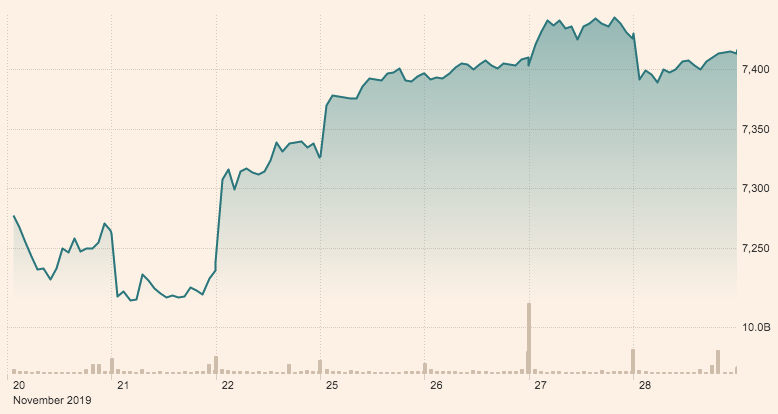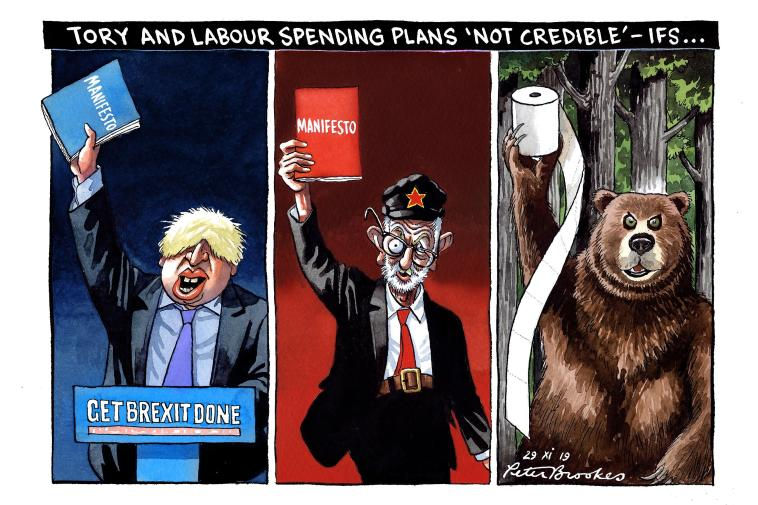- Charlotte Street Partners

- Nov 29, 2019
- 6 min read
Updated: Dec 4, 2019
29th November 2019
Written by Sabina Kadić-Mackenzie, Associate Partner
Edited by Harriet Moll, Creative Director
Good morning,
House prices. A national obsession that probably sits somewhere between Brexit and Bake Off. So let’s indulge that shared passion for a minute with thanks to the Nationwide building society which has just released data showing that despite the economic uncertainty, house price growth in the UK has picked up again.
The average price of a home rose by 0.5% in November to £215,734 – a seven month high. The figure is eye watering when put in context.
For example, if grocery prices had increased at the same rate as house prices since 1971, then a four-pint carton of milk would cost £10.45. A chicken would cost over £50. In fact, the average weekly expenditure on food for a family of four would be more than £450.
When did we turn into a nation so obsessed with the value of our homes? To clarify, I am a homeowner (just) so this isn’t a blame game but I would argue it probably started with the housing policies of every single government since the 1980s, whose baby boomer members have themselves benefited first from lower house prices and then from the right to buy and who have simply stopped investing in the social and affordable housing stock which they have bled dry.
Forgive the “Ok Boomer” moment please but I have to tell you, these home owners have effectively condemned the generations that follow to a lifetime of debt between student loans and sky-high house prices as well as the gradual but deliberate erosion of the social safety net and the after effects of a financial crisis.
And it’s the boomers who benefit the most from rising house prices since one in six of them own a second home and, guess what, after a bit of a dip in 2007-2010, the equity in property continues to rise once again.
As a chorus of homeowners rejoice at the latest news, you may just be able to hear the sigh of a generation of millennials and Gen-Z’ers who have resigned themselves to a lifetime of insecure renting and growing debt.
This isn’t news. We’ve known for some time that housing – or more specifically, home ownership - is split down the middle between the haves and have nots, or more accurately older and younger generations.
It’s surprising therefore that ahead of one of the most significant elections in recent times, wider housing policy – with all its ills, emotion and potential for mobilising the young masses who are registering to vote in their droves – is still only being tinkered with.
By my recollection, housing also failed to make top billing in the last election in 2017.
It begs the question: where are the big ideas and the innovation to solve one of the most pressing issues of our time and how do we create the incentives to make them real? Building the houses that people need whether young or old should be the starting point. In England alone it's estimated that 300,000 affordable homes need to be built every year to keep up with demand.
A home plays such a significant part in all of our health and wellbeing. It literally determines our life chances, our mental and physical health and our ability to thrive.
What do we need to do to fix the housing crisis once and for all, so that we don’t condemn another generation to a rigged market?
It starts with the end of housing being treated as a commodity.
News
Prime minister Boris Johnson has refused to commit to an interview with BBC’s Andrew Neil, saying that he would have "all sorts of interviews with all sorts of people." The leader of the Conservatives confirmed that negotiations for a sit-down discussion with the journalist are still taking place but added that it was not his responsibility to make the final decision. Meanwhile, Jeremy Corbyn, Nicola Sturgeon, Jo Swinson and Nigel Farage have all agreed to be questioned by Neil. In related news, the Conservative Party has accused Channel 4 of breaking its duty of impartiality after the broadcaster’s decision to “empty chair” Johnson with an ice sculpture during its election debate on climate change on Thursday night. Although minister Michael Gove had offered to take the prime minister’s place, Channel 4 said that the invitation was for leaders only. The president of the United States, Donald Trump, has announced the restarting of talks with the Taliban during a surprise Thanksgiving visit to American troops in Afghanistan. Trump’s visit, which marks his first trip to the country, has come amid tensions between the US president and senior military officers after the ouster of navy secretary Richard Spencer. Former South Yorkshire police chief superintendent David Duckenfield has been found not guilty of manslaughter of Liverpool fans in the disaster of April 1989. Duckenfield, who did not give evidence at his retrial at Preston Crown Court, denied causing the deaths of 95 men, women and children to the dismay of families that consider the outcome “disgraceful.”
Business and economy
The Institute for Fiscal Studies (IFS) said that both the Conservative and Labour parties have failed to provide a “properly credible prospectus” for their spending plans, with a Tory government highly likely to spend more than planned and a Labour government probably doomed to introduce further tax rises if it wins the election. The IFS has concluded that the choice between the two parties could “hardly be starker.” Virgin Money has raised the pay of chief executive David Duffy by 84% from £1.8m in 2018 despite the opposition of a third of shareholders. Even when the bank is facing a second consecutive annual loss by a £385m charge for mis-sold payment protection insurance, Duffy’s bumper pay-out was largely driven by a £1.3m bonus linked to the demerger of Virgin Money’s predecessor, CYBG, from National Australia Bank in 2015. British company Dyson has chosen the historic St James Power Station in Singapore for its new global headquarters after the firm headed by Sir James Dyson announced the decision to move the business’ HQ to Asia in January. Sir James, who is known for being a prominent advocate for Brexit, has said that this was a commercial decision and has nothing to do with the UK’s withdrawal from the EU.
Markets
What happened yesterday?
London continued in the red on Thursday amid worries about US-China trade relations while ex-dividends were a drag. The FTSE 100 ended the session down 0.18% at 7,416.43, while the pound was weaker both against the dollar by 0.13% at $1.2904 and off 0.2% against the euro at €1.1724. In corporate news, Johnson Matthey (-0.66%) was hit by a downgrade to “underweight” at JPMorgan and as its stock went ex-dividend, while Melrose Industries (-0.34%) was downgraded to “outperform” at RBC Capital Markets. Online gaming and sports betting software company Playtech (-5.28%) plunged after a downgrade by Morgan Stanley. Ex-dividends weighed for Vodafone (-3.91%), IAG (-1.68%), National Grid (-1.1%), Severn Trent (-0.48%) and Micro Focus (-2.96%). On the upside, British Land (+1.36), Land Securities (+2.92%) and Great Portland Estates (+1.17%) all rallied after upgrades to “overweight” at Morgan Stanley, while Phoenix Group (+1.5%) went up as it said that 2019 cash generation was ahead of target.
What's happening today?
AGMs
Grit Real Est.
Ironridge
Macau Property
Ncondezi Enrg
Oncimmune
Pme Afr.
Quadrise Fuels
Range Resources
Thinksmart Ltd
UK Economic Announcements
(00:01) GFK Consumer Confidence
(07:00) Nationwide House Price Index
(09:30) M4 Money Supply
(09:30) Mortgage Approvals
(09:30) Consumer Credit
Int. Economic Announcements
(07:00) Retail Sales (GER)
(08:55) Unemployment Rate (GER)
(10:00) Consumer Price Index (EU)
(10:00) Unemployment Rate (EU)

Columns of note
In The Times, Ed Conway discusses the problems of trying to put a value on every infrastructure. According to Conway, while some events are forecastable and quantifiable, others are not. The fact that economists have tried hard to attach imponderables into a single number to make complex decisions look evidence-based has now instilled a terror of uncertainty that is making us too afraid of our politicians, financiers, civil servants or business leaders expressing any doubt. Conway regrets that it is easier for decision-makers to point to unreliable cost-benefit analyses than admitting they do not know. (£)
Writing in City A.M., Shazia Ginai argues that we are still far from achieving truly equal representation in the workplace, especially at a senior level. This is because we expect women to perform stereotypically masculine leadership traits, she argues. However, the growing awareness of mental health and wellbeing calls for attributes largely related to women such as communality and empathy. In Ginai’s view, in a world as desperately hungry for human connection as ours, leaders with both strength and sensitivity will enable businesses to thrive.

Did you know?
Although Africa produces 70% of all cocoa in the world, it only gets two per cent of the $100b chocolate market revenue.
Parliamentary highlights
TODAY House of Commons No business scheduled House of Lords No business scheduled Scottish Parliament No business scheduled

Comments